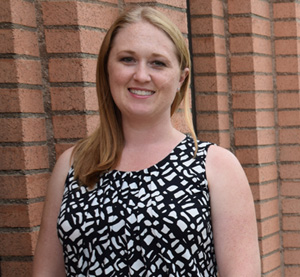
Jenna Leventhal
Jenna Leventhal was first introduced to the USC Shoah Foundation as an undergraduate at UC Santa Barbara, working on a project for a public history course. Now, as manager of IWitness, she says her journey from student to Shoah Foundation education staff has come full circle.
Leventhal received her master’s in public history from the University of Houston and in 2011 joined the staff of the USC Shoah Foundation to work on IWitness, its new educational website that allows students to interact with testimony from the Visual History Archive, which at the time was still undergoing testing and development. IWitness drew on Leventhal’s interest in how history can be brought to life for different audiences.
IWitness allows students to watch testimonies of survivors and witnesses of the Holocaust and Rwandan Tutsi Genocide and use them in individual or group multimedia projects. In a way that transcends traditional print materials, the interactive, audio-visual form of IWitness connects learners with contextualized first-person views of history while training them to master the digital and media literacies necessary for the future.
While IWitness was originally a tool to teach primarily about the Holocaust, Leventhal said with its new Rwandan testimonies and new types of activities – video editing and Information Quests – IWitness can now be used in many different subjects. For example, earlier this year IWitness added its first activity focused on the voices of Japanese-American and African-American liberators, who experienced racism and prejudice in the United States before and after World War II.
“Teachers don’t just have to be teaching the Holocaust to find it useful. You really can find intersections across the curriculum,” Leventhal said. “It’s making IWitness available and bringing the testimonies – these full life stories – to a much wider audience than they ever would have before.”
In spring 2014, the first-ever winner of the IWitness Video Challenge was crowned. In the inaugural IWitness Video Challenge, the USC Shoah Foundation invited students from all over North America to be inspired by testimonies in IWitness and to use their innovation and creativity to create positive value in their communities by doing something ordinary (or extraordinary) and then build a video telling the story about how they contributed to making their communities a better place. The winner was Ruth Hernandez, a Philadelphia high school student who was inspired by testimony and her own family’s history to participate in a rally for immigration reform.
Leventhal said she was excited to see how many students took on the challenge and the diversity of the projects they completed in their communities.
“Ruth herself said it best: it was a way to give students a voice,” Leventhal said. “It helped give them agency, it empowered students to go out and do something that mattered to them.”
The next IWitness Video Challenge will be launched in time for the new school year. In addition, IWitness will begin offering a new type of activity designed to be more flexible and fit into teachers’ existing curriculum. But in the two years since IWitness officially launched, Leventhal has already witnessed how deeply students are affected by watching testimony of genocide survivors.
“They have that really close connection with [survivors] they’ve never met, who may or may not be alive anymore, and I think that’s a pretty powerful thing. It stays with them.” she said.
From her first introduction to the USC Shoah Foundation as a student to now, Leventhal said working on IWitness is an ideal intersection of her passions for history, education and innovation.
“It’s really the intersection of what I was so interested in early on: How do we make history interesting and relevant and engaging?” she said. “Now I get to play a role in shaping this amazing tool that does just that.”